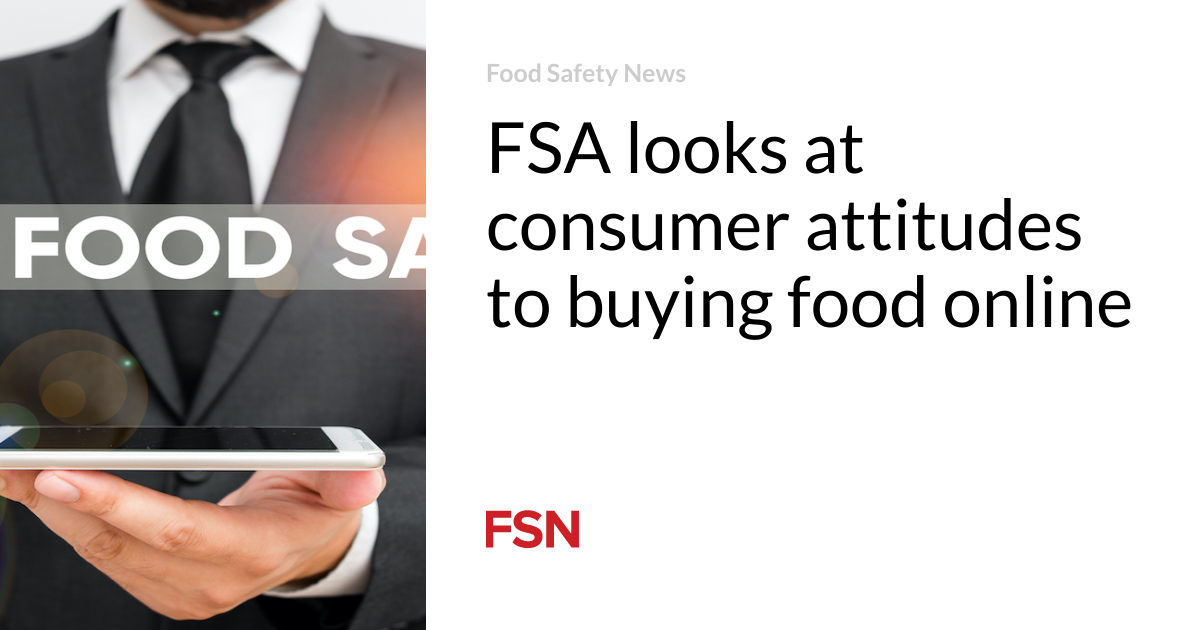Factors such as the seller and the product type influence consumer trust in the hygiene and safety of food sold online, according to research.
The Food Standards Agency (FSA) commissioned research to understand consumer attitudes toward buying food online, including the perceived risks.
Findings come from 12 online discussion groups with 69 people in England, Wales, and Northern Ireland in February 2022. It covers ordering food through established businesses, which have a physical presence, such as supermarket websites and delivery service apps, to getting food through social media platforms like Facebook Marketplace and food sharing apps including Olio and Too Good To Go.
Three groups emerged, those who rarely or never buy food online, those who do but only on supermarket websites, and those who frequently buy food online including via social media. Attitudes to buying food online were linked to current purchasing behaviors.
Participants who did not frequently purchase food online tended to cite practical reasons to explain this behavior and did not have specific concerns about safety or hygiene. Some respondents worried that aggregator delivery drivers were not subject to food safety and hygiene requirements and uncertainty about how consistently food would be transported at the right temperature.
Factors influencing safety view
Convenience was the main reason people said they bought food online. Many participants reported doing this more frequently than before the COVID-19 pandemic.
Dietary requirements and hypersensitivities were considered, with respondents explaining that ingredient lists, and nutritional information was important.
Factors that influenced the extent to which participants trusted, and had confidence in, the safety of food bought online were familiarity, sellers’ need to protect their reputation, assumptions about regulation, endorsement, type of food, and previous negative experiences.
Confidence in online food was influenced by familiarity with establishments, sellers, and platforms. Some participants questioned whether food hygiene standards were enforced, monitored, or even required for online food purchasing platforms. They also had concerns about the way food was stored, packaged, and delivered.
There were frequent references to not feeling comfortable buying food “from strangers.” Many participants were surprised that food could be sold through social media platforms, such as Facebook Marketplace, even when they were used to buying food online. Participants were worried about individual sellers’ cleanliness and hygiene when preparing food in their own kitchens, the ingredients used, and a lack of accountability.
People mentioned different foods which they would not feel comfortable buying online, as they deemed them to be higher risk such as meat, fish, eggs, dairy, and rice.
Responsibility and regulation
Previous negative experiences influenced participants’ confidence in the quality and safety of food bought online.
There was little detailed understanding or awareness of the regulations in place to ensure that food purchased online is safe. Participants saw roles for online platforms, aggregators, individual sellers, and local authorities.
Aggregators including Just Eat, Uber Eats, and Deliveroo were seen as being responsible for ensuring that food ordered through their platforms was transported and delivered safely. People thought that in the case of purchasing through Facebook Marketplace, responsibility for risk lay with consumers, rather than the platform as it was not primarily focused on selling food.
Some people mentioned checking Food Hygiene Rating Scheme (FHRS) ratings for outlets when ordering through aggregator apps to give confidence in the safety of the food.
Participants agreed the FSA should be involved in the regulation of food sold online. However, they typically did not have strong views about what this should look like in practice.
Topic on FSAI’s radar
Meanwhile, the Food Safety Authority of Ireland (FSAI) held an event recently to discuss online sales of food, from the consumer, regulator, and industry perspectives.
More than 240 people registered for the virtual event with Irish and international speakers plus representatives from Deliveroo, Manna Drone Delivery, and Dropchef. The session highlighted the importance of securing consumers’ trust that food hygiene practices and food safety legislation are being followed.
Pamela Byrne, FSAI chief executive, said food safety must remain front and center, regardless of advances in technology or delivery methods.
“There must be a steadfast trust that all those involved in supplying, producing, marketing, and delivering will adhere to the highest standards of food safety and hygiene on an ongoing basis. While this is undoubtedly an exciting time for innovation with huge opportunities to use technology to grow food businesses and offer new production, preparation, and delivery models, those opportunities also bring operational, regulatory, and food safety challenges,” she said.
“At the FSAI, we continue to explore ways in which we can evolve our regulatory approach, to improve transparency for consumers to support them in making informed choices, and work with businesses with the common goal of ensuring safe and trustworthy food.”
(To sign up for a free subscription to Food Safety News, click here)

